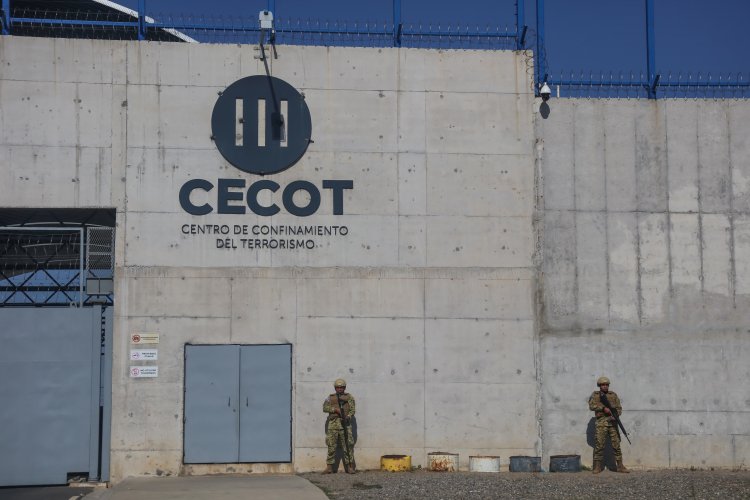He was shielded from deportation by a legal agreement. Despite this, Trump deported him.
Court documents, news articles, and family appeals provide fresh insights into the 20-year-old Venezuelan man who a judge has ordered to be returned from El Salvador.

However, another individual has also been identified by a judge as having been improperly deported to El Salvador and must be returned.
This man's case has received considerably less attention than that of Abrego Garcia, and many details regarding him, including his name, have been kept confidential amid the ongoing court proceedings related to his deportation.
PMG has revealed his identity as Daniel Lozano-Camargo, a 20-year-old Venezuelan citizen who resided in Houston and operated a car detailing business until March 15. On that date, the Trump administration designated him as an “alien enemy” and swiftly deported him to an El Salvador prison along with numerous other men.
Lozano-Camargo's situation reflects that of many affected by President Donald Trump’s controversial use of the Alien Enemies Act. Like numerous Venezuelans expelled under this wartime authority, he asserts that he fled to the U.S. to escape persecution in his homeland. Additionally, his family believes he was mistakenly identified as a gang member due to his tattoos.
Despite having faced two minor legal issues related to drug offenses, his family maintains that he has no connections to Tren de Aragua, the Venezuelan gang that Trump claims poses a threat to the U.S. The Trump administration has not publicly provided evidence supporting its allegations against Lozano-Camargo in regard to gang affiliation, although some court documents remain sealed.
“My son isn't one of Tren de Aragua,” his mother, Daniela Camargo, declared in a tearful Facebook video. “Anyone who knows my son knows he's innocent.” Neither Lozano-Camargo’s lawyers nor his family immediately responded to requests for comments.
Importantly, Lozano-Camargo was included in a 2024 legal settlement that prohibited immigration authorities from deporting him while his asylum request was pending. U.S. District Judge Stephanie Gallagher, who was appointed by Trump and approved that settlement, determined last month that Lozano-Camargo’s deportation violated the terms of the agreement.
Gallagher instructed the administration to “facilitate” Lozano-Camargo’s return; however, the Trump administration is resisting this order. A court filing released on Monday by the Justice Department labeled Lozano-Camargo a member of “a violent terrorist gang,” claiming this disqualifies him from seeking asylum in the U.S.
The DOJ lawyers argued that, consequently, bringing Lozano-Camargo back to the U.S. “would no longer serve any legal or practical purpose.”
A hearing on this matter is scheduled for Tuesday in Gallagher's Baltimore courtroom.
In public court filings, Lozano-Camargo is referred to only as “Cristian.” Gallagher approved the pseudonym at the request of lawyers advocating for immigrant rights. This ruling applied strictly to the parties involved in the case, although it did not extend to others outside the litigation.
In her previous ruling, Gallagher noted that “Cristian” was “fleeing danger and threats in Venezuela.” She further stated that he and other similarly situated immigrants “clearly face the risk of retaliatory harm in their home country, as well as in detention in El Salvador and potentially within the United States, if their identities are made public.”
However, embedded metadata in a government filing surprisingly included Lozano-Camargo’s full name. While the name was redacted in the rest of the declaration from an Immigration and Customs Enforcement official, it included information about a drug conviction that helped PMG verify Lozano-Camargo’s identity.
PMG also found social media posts from Lozano-Camargo’s family members seeking broader attention for his case in hopes of securing his return to the U.S.
PMG informed Lozano-Camargo’s lawyers via email that this article would reveal their client’s name and additional details about his circumstances. The attorneys were also given a chance to explain why confidentiality should be maintained in light of the significant media attention Lozano-Camargo’s deportation had already drawn.
The lawyers did not respond to these inquiries. Instead, they issued a statement asserting that the government has an obligation to allow Lozano-Camargo and other immigrants to pursue their asylum claims in the U.S.
“We filed this motion to hold the government accountable to the promises it made to the Court and to the thousands of vulnerable young people whose futures depend on the integrity of this process,” the attorneys stated. “We are grateful that the court upheld the rights of Cristian and other class members to pursue their asylum claims safely in the United States.”
Lozano-Camargo's mother and girlfriend did not reply to messages on Monday seeking their comments.
Court records in Texas indicate that Lozano-Camargo had two prior arrests in the last year for cocaine possession. In June, he was arrested by Houston police and charged with having between one and four grams of cocaine, subsequently being released on a $1,000 personal recognizance bond, which was later revoked after missing a court date in October.
In November, he faced another arrest by the Texas Department of Public Safety for possession of less than a gram of cocaine, with bail set at $2,500, which he appears not to have been able to raise.
In January, Lozano-Camargo pleaded guilty to a reduced felony drug charge as part of a plea deal. He was sentenced to 120 days in jail, with credit for 63 days already served before being transferred to U.S. Immigration and Customs Enforcement custody, which had initiated a detainer claiming he was in the U.S. illegally.
However, Lozano-Camargo had a valid work permit and was awaiting a decision on his asylum application, meaning he should not have been deported until that matter was resolved, according to immigrant rights advocates. Judge Gallagher agreed.
She stated that his deportation, as of April 23, contravened “the plain terms of the Settlement Agreement and fundamental tenets of contract law,” referring to the November 2024 settlement—overseen by a formal court order—in which the U.S. government agreed not to deport individuals who entered the U.S. as unaccompanied minors until their asylum claims had been fully adjudicated.
Gallagher's ruling marked the second occasion where courts declared that the Trump administration violated existing court orders by deporting individuals to a notorious El Salvador prison in March.
The first ruling pertained to Abrego Garcia, a Maryland resident living with his U.S. citizen wife and children. U.S. District Judge Paula Xinis ruled that the administration had disregarded a 2019 immigration-court order preventing the deportation of Abrego Garcia due to the risks he faced upon return. The Supreme Court upheld Xinis’ directive for the administration to facilitate his return, affirming that Abrego Garcia's deportation was “illegal.”
Currently, Xinis, an Obama appointee, is conducting an intensive fact-finding inquiry surrounding the administration's failure to return Abrego Garcia.
Both Abrego Garcia and Lozano-Camargo were on the same flights used for deportations on March 15, which have raised significant scrutiny due to the minimal due process afforded to the men being deported. However, while the administration cited the Alien Enemies Act as grounds for Lozano-Camargo’s deportation, it did not use this argument in Abrego Garcia's case.
Both individuals were taken to the El Salvador prison known as CECOT, an acronym for the Terrorism Confinement Center. Authorities later transferred Abrego Garcia to a different facility after heightened media attention.
As for Lozano-Camargo, whose situation has not garnered as much public visibility, he is believed to still be in CECOT.
Lozano-Camargo's family has been actively seeking assistance. Though his name was meant to be hidden in court documents, it has been publicized due to his inclusion in the March 15 deportation flights. His profile and images have appeared in The Guardian and the Venezuelan online news outlet, El Estímulo.
Additionally, his name was included in a U.S. government list of the 238 Venezuelan men deported on those flights, which CBS’s “60 Minutes” published. The media coverage propelled his story onto a Facebook page highlighting “the Disappeared,” with a plea stating, “Please share Daniel's story, it could save his life.”
Lozano-Camargo grew up in Maracaibo, Venezuela, and lived briefly with an uncle in Colombia before arriving in the U.S. in 2022 as a 17-year-old. Reports indicate that he entered the U.S. without legal authorization and was housed in a facility for unaccompanied minors until he turned 18.
In Houston, he operated a car detailing business and marketed his services on Facebook. He also contributed to raising his girlfriend's young daughter, who was born shortly after they met. A lawyer’s filing adds that he worked on “detailing vehicles” and was parenting his girlfriend’s daughter “as his own child.”
News reports suggest that authorities' suspicions about his tattoos, which include a rose, praying hands, and the names of his girlfriend’s daughter and grandmother, contributed to his detention.
His mother and grandmother have consistently denied any gang affiliation.
In a heartfelt Facebook video posted four days after the deportation flights in March, Daniela Camargo expressed her shock. “It turns out that … the one who's surprised is me: They took him to El Salvador, as if they were animals, as if my son were a criminal, just for having tattoos on his body,” she lamented in Spanish. “My son only came to this country to have a better future… The only mistake we've ever made, the only crime we've ever committed, was crossing into this country.”
Daniela Camargo also called for greater visibility regarding her son’s situation.
“Please investigate,” she urged. “I hope you will help me spread this video.”
Reports indicate that Lozano-Camargo’s grandmother and girlfriend were left uncertain of his whereabouts at CECOT until the list published by “60 Minutes” appeared online.
Mathilde Moreau for TROIB News












